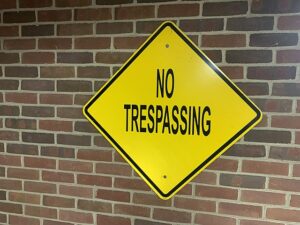
by Wilton H. Strickland
Every law student in the United States eventually reads the famous case of Katko v. Briney, 183 N.W.2d 657 (Iowa 1971). The Brineys were a married couple who owned a vacant farmhouse and used it to store personal items. The farmhouse endured frequent break-ins and burglaries, even though the Brineys had boarded it up and posted multiple “no trespassing” signs. Mr. Briney ultimately decided to install a shotgun that was rigged to go off if someone entered the main door, though his wife persuaded him to aim the gun downward toward an intruder’s legs. One evening Mr. Katko broke into the farmhouse and took a shotgun blast to his leg. He survived and, quite predictably, filed a lawsuit for compensatory and punitive damages. Not only did Mr. Katko win the lawsuit, but his victory was affirmed on appeal. When Mr. Briney later was asked if he would have done anything differently in hindsight, he responded that he would have aimed the gun higher.
The outcome of the case tends to confuse or anger many people, who view it as a double theft against the Brineys and a violation of their right to defend their property. There indeed is such a right, but as the Iowa Supreme Court explained, the right does not justify causing great bodily harm or death when one’s own life is not threatened. If the Brineys had occupied the farmhouse when the break-in occurred, deadly force might be justified; the fact that the farmhouse was vacant meant that only property was in danger, making deadly force unjustified.
So, the issue is not whether you may use force to defend mere property, but rather how much force is appropriate. This is an important question when considering the growing phenomena of porch pirating, shoplifting, and refusal to leave private premises on request.
Both Florida and Montana have statutes recognizing the right to threaten or use an amount of force that a person “reasonably believes” necessary to protect real property or personal property, even if the real property is not a dwelling. Fla. Stat. § 776.031; Mont. Code § 45-3-104. The force must not be deadly, unless it is to prevent a “forcible felony” that endangers human life. Fla. Stat. §§ 776.08, 776.031(2); Mont. Code §§ 45-3-101(2), 45-3-104.
Florida and Montana differ slightly on what happens if a person exercising this right is later sued in court. Florida provides total immunity from civil or criminal suit, and a person who is wrongfully sued can recover attorney’s fees and costs. Fla. Stat. § 776.032(1), (3). Montana provides merely an affirmative defense, which would have to be pleaded and proved within the lawsuit (at one’s own expense). Mont. Code § 45-3-115.
Florida and Montana also recognize a special “shopkeeper privilege” that allows store owners to use a reasonable amount of force to detain suspected shoplifters, provided that the owners follow statutory requirements. Fla. Stat. § 812.015; Mont. Code § 46-6-506. The Florida statute immunizes store owners from civil and criminal liability, though the Montana statute provides immunity only from damages.
The case law from Florida tends to focus on the use of force to defend oneself or one’s home, not other property. Montana, however, has some helpful cases to consider:
- Firing a rifle in the direction of trespassers who threatened to destroy the defendant’s water source was not justified, even though the shot was a warning rather than an attempt to hit them, since this still amounts to lethal force beyond what is reasonably necessary. Kaestner v. Masten, 2012 MT 286N, ¶¶ 25-28, 368 Mont. 413 (2012).
- Brandishing a handgun to prevent theft of a trailer was not justified because the defendant already had disabled the trailer and blockaded it, making additional force unnecessary. Mont. v. Koenigsberg-Tyrvaldsen, 2014 MT 165N, ¶ 9, 375 Mont. 555, 346 P.3d 1135 (2014).
- Brandishing a handgun to expel persons from an inn was not justified, where those persons had entered the inn during operating hours and had not yet been instructed to leave. State v. Crabb, 232 Mont. 170, 173-75, 756 P.2d 1120, 1122, 1123 (1988).
It’s important to note that landlords should not attempt to use force to eject tenants who fail to pay rent or overstay their lease. This is because a tenant’s right to occupy the premises is treated as a legal issue that must be resolved by a court through established procedures.
Also, as a practical matter, I recommend avoiding the use of force in all walks of life unless there is no reasonable alternative. Even if you are legally justified in your actions, there is no telling what the other person might do, let alone or what a judge or jury might do later.


